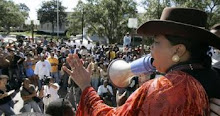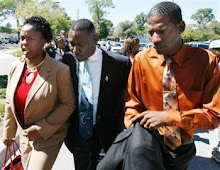
Article
Associated Press
By MELISSA NELSON
October 5, 2007
PANAMA CITY, Fla. (AP) — The medical examiner who performed a second autopsy on a teen who died after a boot-camp altercation defended his findings on the witness stand Friday and said it didn't take a doctor to figure out the boy did not die of natural causes.
Dr. Vernard Adams, Hillsborough County's medical examiner, testified in the manslaughter trial of seven boot camp guards and a nurse charged with killing Martin Lee Anderson. The 14-year-old died a day after guards hit him in a 30-minute videotaped altercation at the Bay County sheriff's boot camp.
The first autopsy found that Anderson died after exercise brought on complications from sickle cell trait, a genetic blood disorder. Set against videotape of the guards repeatedly hitting the unresponsive boy, the finding outraged civil-rights activists and helped generate protests at the state Capitol.
In his autopsy and on the stand Friday, Adams said the guards suffocated Anderson by covering his mouth and forcing him to inhale ammonia fumes. He said sickle cell trait aggravated the problems Anderson was experiencing, but that he would have died even without the disorder.
"My opinion is there is enough suffocation going on here to kill anybody," Adams said.
Aside from the autopsy and an examination of Anderson's medical records, Adams said he spent hours watching an enhanced video of the altercation before determining the boy did not die from natural causes.
"It does not require a medical person to determine this. The video clearly shows his airway was obstructed by an external agency," Adams said.
Waylon Graham, attorney for guard Charles Helms, asked Adams whether he felt pressure to come to a different conclusion than the one reached by Dr. Charles Siebert, the Bay County medical examiner who did the initial autopsy.
Graham went over the vilification of Siebert by civil-rights groups, pressure from then-Gov. Jeb Bush — who appointed a special prosecutor in the case — and protesters marching in front of Adams' office, among other factors.
Here "you are a well-respected medical examiner and it is all coming down to this pinnacle, it is all focusing on you like a laser beam," Graham said in cross-examination of Adams.
Adams said he did not tailor his findings to satisfy the demands of anyone, including Bush, the NAACP or the special prosecutor, Hillsborough County State Attorney Mark Ober.
Adams said he felt he would be criticized regardless of his findings and that he wouldn't wish the type of scrutiny experienced by Siebert on anyone.
"That's why I took my time (with the second autopsy)," he said.
Graham also suggested Adams was pressured by nationally known pathologist Dr. Michael Baden, who consulted on the case on behalf of Anderson's family. He observed the second autopsy and said Anderson likely was suffocated during the confrontation.
Adams said he allowed Baden only to observe the 12-hour autopsy, and that Baden's fame did not influence his findings.
Defense attorneys have argued Anderson's death was unavoidable once he collapsed while running laps at the camp's exercise yard. They say sickle cell trait was the only cause.
The trait is a usually benign disorder generally found in one in eight African-Americans. It can cause blood cells to shrivel into a sickle shape and limit their ability to carry oxygen under stress.
Graham asked Adams whether his testimony contradicted that of Dr. Thomas Andrew, New Hampshire's chief medical examiner. He told jurors a day earlier that the death was caused by a chain of events that triggered the blood disorder's complications.
Adams said he differed from Andrew's findings "not very much."
"What I said was it was reasonably possible that sickle cell trait contributed to his death," Adams said.





